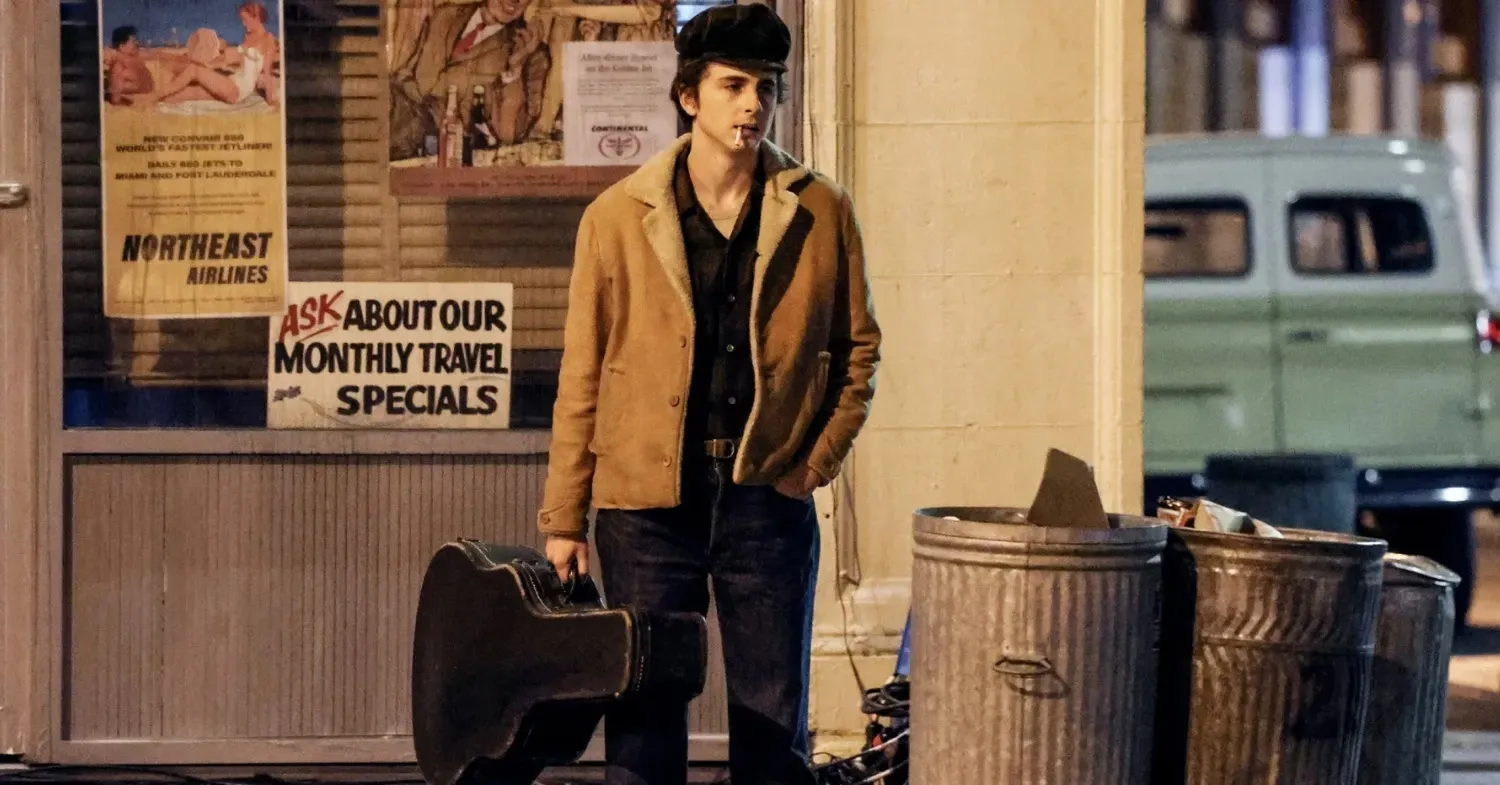As a Minnesotan, I feel almost obligated to enjoy A Complete Unknown, the movie that chronicles Bob Dylan’s rise to stardom while exploring his strained relationship with music and the people who helped shape his career. Dylan is undeniably one of the most famous musicians of all time—and certainly one of the most iconic figures to emerge from the land of 10,000 lakes.

James Mangold captures Bob Dylan’s enigmatic personality and off-kilter wit, framing him as a perpetual outsider. Everyone has their version of who they think Bob Dylan should be, but as Bob himself puts it, “Everybody has their own image of themselves. They forget the bad parts and only remember the good ones.” In response to these projections, Dylan floats through life, weaving in and out of the lives of those around him, never fully staying put.
In this way, A Complete Unknown becomes less about Dylan the man and more about Dylan the idea—what he represents and how he defies definition. The film captures the impossibility of pinning him down: just as you think you’ve gotten close, his free-spirited mind and singular personality slip through your fingers. Timothée Chalamet embodies this beautifully, nasally mumbling through conversations and songs alike while maintaining the gravitas that makes Dylan so compelling. He’s a character who lingers thoughtfully on every word, keeping you hanging on, wrapped around his finger.
All of these reasons are perhaps why I like A Complete Unknown more than your typical run-of-the-mill musical biopic—because, at its core, that’s exactly what it is. Mangold approaches Bob Dylan with care, admiration, and intrigue, embracing his enigmatic character, but the filmmaking itself doesn’t quite match that ambiguity. Instead, the narrative plays things straight, moving methodically from one beat to the next, as though the film’s primary goal is to cover the first four paragraphs of Dylan’s Wikipedia page after he arrives in New York.
James Mangold has developed a reputation for crafting star-driven dramas with meticulous, diorama-like historical accuracy (Ford v Ferrari and Walk the Line come to mind). But this washed-out, overly polished approach doesn’t mesh well with the chaotic energy of Bob Dylan’s life and persona. Dylan, a famously idiosyncratic musician with a quirky voice, juggled multiple relationships and aggressively avoided being pigeonholed as a folk star. Yet, aside from the latter, Mangold only lightly suggests that these complexities are issues at all, leaving much of the intrigue feeling underexplored.
This oversight extends to the supporting performances, many of which fall flat. Elle Fanning portrays Sylvie Russo, a character drawn to Bob despite his fleeting, unpredictable nature. Her plotline culminates abruptly when, during Dylan’s groundbreaking performance at the Newport Folk Festival in 1965, Sylvie is overwhelmed by his fame and runs off mid-set. That’s the last we see of her, and the lack of resolution leaves the subplot feeling undercooked. Instead of adding emotional depth, it raises the question of why Mangold included it at all if he had so little interest in giving it meaningful weight.
And Mangold layers one loosely developed story of a Bob Dylan love interest with a second one. Sylvie competes for Dylan’s attention with Joan Baez (Monica Barbaro), Dylan’s real-life frequent collaborator and touring partner. The two artists share a close bond, covering one another’s songs and performing together often. Their relationship eventually sours, but not before it drives a significant wedge between Sylvie and Dylan.
Monica Barbaro arguably gives the best supporting performance in the film outside of Boyd Holbrook’s hilariously pinpoint take on Johnny Cash. Her vocal performances are consistently strong, and she’s one of the few actors whose presence feels as dynamic as Timothée Chalamet’s when they share the screen.
On the other hand, Edward Norton appears as the soft-spoken folk artist and Newport Folk Festival producer Pete Seeger. Norton makes plenty of well-mannered acting choices, but the friendly camaraderie between his character and Dylan wears thin quickly. It’s a subplot that feels more like filler than a necessary addition to the film’s narrative.
Perhaps the only reason A Complete Unknown works at all is Timothée Chalamet’s captivating and convincing portrayal of Bob Dylan. Chalamet fully embodies Dylan’s squirmy attitude in public settings, his insistence on remaining as enigmatic at the end of the film as he is in the beginning, and his relentless drive to create music that feels entirely new. His physicality matches Dylan’s skinny frame and restless energy, while his screen presence captures the frailty and determination of an artist constantly searching for the next breakthrough. It’s a fully realized, astonishing performance that anchors the film.
READ MORE MOVIE REVIEWS: The Seed of the Sacred Fig, Small Things Like These, Carry-On
I typically dislike musical biopics. From Bohemian Rhapsody to Elvis to Bob Marley: One Love, most of these films feel like lifeless historical reenactments, leaping from event to event without much depth. In A Complete Unknown, James Mangold makes an earnest attempt to mine Dylan’s internal conflict—the tension between wanting to please his peers and pushing the boundaries of musical creativity. The execution ultimately becomes muddled and quite conventional compared to the subject it’s dissecting, but not before delivering one of the standout lead performances of 2024. And because I’m Minnesotan, I’ll admit—it was all worth it in the end.
Score: 6/10
A Complete Unknown (2024)
- Cast: Timothée Chalamet, Edward Norton, Elle Fanning, Monica Barbaro, Boyd Holbrook, P.J. Byrne, Scoot McNairy, Dan Fogler
- Director: James Mangold
- Genre: Drama, History, Musical
- Runtime: 140 minutes
- Rated: R
- Release Date: December 18, 2024